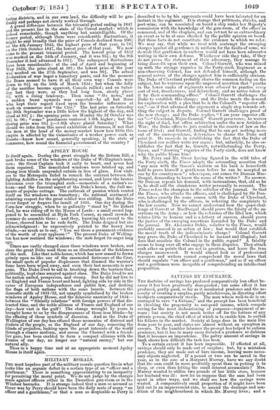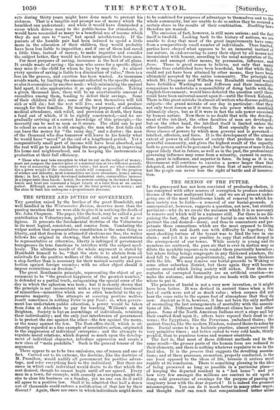SAVINGS BY INSURANCE.
THE doctrine of savings has produced comparatively less effect be- cause it has been practically disregarded ; but some effect it has produced, partly good, so far as it inculcated prudence and the ne- cessity of creating a surplus, partly mischievous, in directing effort to objects comparatively sterile. The man who is well-to-do is en- couraged to save "a fortune," and the precept has been beneficial in checking the propensity to outspend income, which compels saving for the most disheartening of purposes—repayment of par- rears ; but society is not much better off for the fortune of any private person, the chief effect of which is to enable him to outbid his fellows in the market. Society at large does in the main live from year to year, and states are almost without an exception in. arrears. To the humbler labourer the precept has helped to enforce prudence, but it has in many cases dictated a prudence so dubious that it becomes an imprudence. The paltry amount of savings in bank shows how difficult the task has been.
To a certain extent it has been impossible. If effected at all, savings should only be made out of surplus ; but, by a mistaken prudence, they are made out of bare income, leaving more neces- sary objects neglected. If a pound or two can be saved in the year, as in the case of a Margaret Murray, have we any doubt that the sum could be more profitably spent than in putting it to sleep, or even than letting the small interest accumulate ? Mrs. Murray wanted to utilize two pounds of her little store, because her husband was ill: now let us suppose that the sum had been spent in other ways, and we shall see how the savings were wasted. A comparatively small proportion of it might have been laid out in an improvement-rate, to amend the drainage and con- dition of the neighbourhood in which Mr. Murray lives ; and a rate during thirty years might have done much to prevent his sickness. That is a tangible and prompt use of money which the humblest can understand ; and while it would have diminished a cause which drives many to the public-house for stimulants, it would have reconciled as many to a beneficial use of income which they do not care to " save," but spend mischievously. If the parents of the humble pair had been induced to spend a little more in the education of their children, they would probably have been less liable to imposition; and if one of them had saved a little time, instead of money, to make inquiries and consider the subject better, they would not have misplaced their insurance. For most purposes of saving, insurance is the best of all plans. It avoids waste of saving : the man who saves for a specific object may miss it—the child for whom he lays by may die. iks almost every species of saving is liable to a diminution of value,* there is a loss on the process, and exertion has been wasted. As insurance avoids waste, by limiting the amount collected to the specific object, so also it economizes by another mode : while minimizing the amount laid apart, it also appropriates it as speedily as possible. Taking a given thousand men, there will be an ascertainable amount of casualties among them, tending to defeat their savings. Some of their children will die ; some of the men themselves will fall sick or will die; but the rest will live, and work, and produce enough for their families. By insuring for purposes of education, medical attendance, sick relief, and provision at death, they form a fund out of which, if it be rightly constructed,—and we are gradually arriving at a correct knowledge of this principle,—the necessity can be met as soon as it occurs. The child can be put to school as soon as it is old enough; the man who first falls sick can have the money for "the rainy day," and a doctor; the man of the thousand who dies tomorrow will leave to his family what he would have "saved" at the end of a lengthened period. Yet a comparatively small part of income will have been absorbed, and the rest will go to assist in feeding the man properly, in improving his home and neighbourhood, and in keeping the instruments of production at their full efficiency.
• Those who may take exception to what we say on the subject of money, must not compare the market-price of a nominal sum at two different periods, by way of measuring the comparative value ; but must see what commodi- ties a given weight of the standard metals will command. By the progress of science and industry, most commodities are more abundant, money among them; in fact, in a highly developed industrial state, commodities increase in a larger ratio than hands : hence, the powers residing in the naked human hands and head can command a larger return at a later than at an earlier period. Although goods are cheaper at the later period, so is money ; and the store in bank has undergone a proportionate discount.



































 Previous page
Previous page